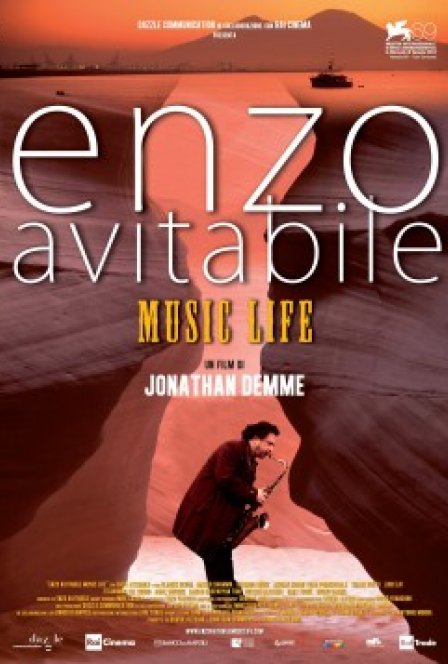Within the first ten minutes of Enzo Avitabile Music Life, one thought lurked, half-formed, in the backdrop of my head until it finally sidled out on stage and presented itself” “Jesus Christ, this guy could be the 1986 Motley Crue of liberal arts college tours.” The music, poli sci, and language department heads would merge as one single sycophant entity draped at his Italian-slippered feet. The suburban gurl who’s President of the Amnesty chapter and won’t shut up about Malcolm Gladwell would be rendered to a Belieber to his culturally shimmering personage. I have no idea how this has not happened yet, and I expect it to occur in the immediate future.
Enzo Avitabile Music Life is a standard documentary in the way of production concerning a prolific artist and composer with a scope as wide as the world. Fairly innocuous in the US, Enzo is a figure of fanfare and fawning in his native Italy and a prominent individual of the “world music” stage. Typically I’m immediately suspicious when I hear the phrase “world music.” The accompanying image consists of a chardonnay day-drunk soccer mom fumbling through the CD rack at Starbucks trying to remember why she got a degree in Soc/Anthro. The moral hand-wringing over amorphous enemies like children crying, starvation, and religious cooperation are thick and trying, but the redemptive core of this documentary is a man enamored of music who has done more with the discipline than a graduating class at MIT.
Enzo Avitabile is charismatic, and this is not lost on the film’s creators. Established for having worked with the likes of James Brown and Tina Turner, Enzo is connected and revered with incredibly talented musicians from places ranging from India to Cuba and back again. I was expecting Omar Souleyman or Rodrigo y Gabriela to show up the entire time. Moving disjointedly between reminiscences, performances, and interviews, the narrative never feels able to find proper footing, probably due to the fact it constantly had its eyes on Enzo. Around 40 to 50% of the film consists a close frame on the musician talking or playing, ranging from a gelled lens while he talks about his father for around two minutes to animatedly discussing a Sardinian ritual of dancing in church. There is a weird serenity he projects that makes you gloss over whatever he’s talking about. At one point he referenced undergoing a “double cornea transplant” (is that medically possible?), and it took me ten minutes to think of calling bullshit.
Along with pasta and sex scandals, Italians also invented histrionics. Overt melodrama and maudlin displays of affection crowd Music Life like an overstaffed orchestra on a coffee shop stage. From the onset of the film the sentiment is clear Enzo is an accomplished and beloved figure, but it’s like every scene forgot the last scene made a point of this and scrambles to push the pedestal up higher. In one scene in particular, the crew is interviewing Enzo’s “children,” a Colors of Benetton catalog ensemble the artist fostered and mentored over the years. The devotion and ardor in their faces and voices makes not drawing a religious following parallel difficult. Regarding religion, Enzo forays into both Buddhism and Catholicism, but his reconciliation of the two feels held together by a thousand “Coexist” bumper stickers. His conclusions on the two faiths coupled with the shots of his “children” forced to mind Robert M. Pirsig and the space cadets of Haight and Ashbury looking for a figure to throw their lot in with.
I can see why the director and producers found all of this hero worship necessary in that Enzo Avitabile is an activist and heavily conscious about world strife, but this documentary fucking shines when he’s just playing. Taking all other aspects of the narrative away, this documentary functions fantastically as a concert doc. It is music nerd porn and some of the finest I’ve seen in a long time. In one jam in particular (yes I’m going to use “jam”), Enzo sat down in a lofty, empty, fresco-strewn building with a sitar player, a Flamenco guitarist, a drummer versed in Indian rhythm and phrasing, and an Armenian guitarist. It was astounding. The degree of sheer musical talent crowding that room was reverential. It’s really in the scenes where Enzo’s not talking about corneal transplants or bridges between Catholicism and Buddhism where the audience realizes why he was chosen for a documentary. The man has a natural affinity for leading and conducting music, and that in and of itself is reason to watch this.
Documentaries concerning a great musician are a hard road to track. Becoming mired in the figure’s image and constantly toasting to legacy are easy and understandable pitfalls, but at the core of the endeavor, there’s a reason why this individual was deemed important enough to follow around with a camera. Enzo Avitabile Music Life should be perceived just as the title suggests: a man who spent his life steeped in music.

